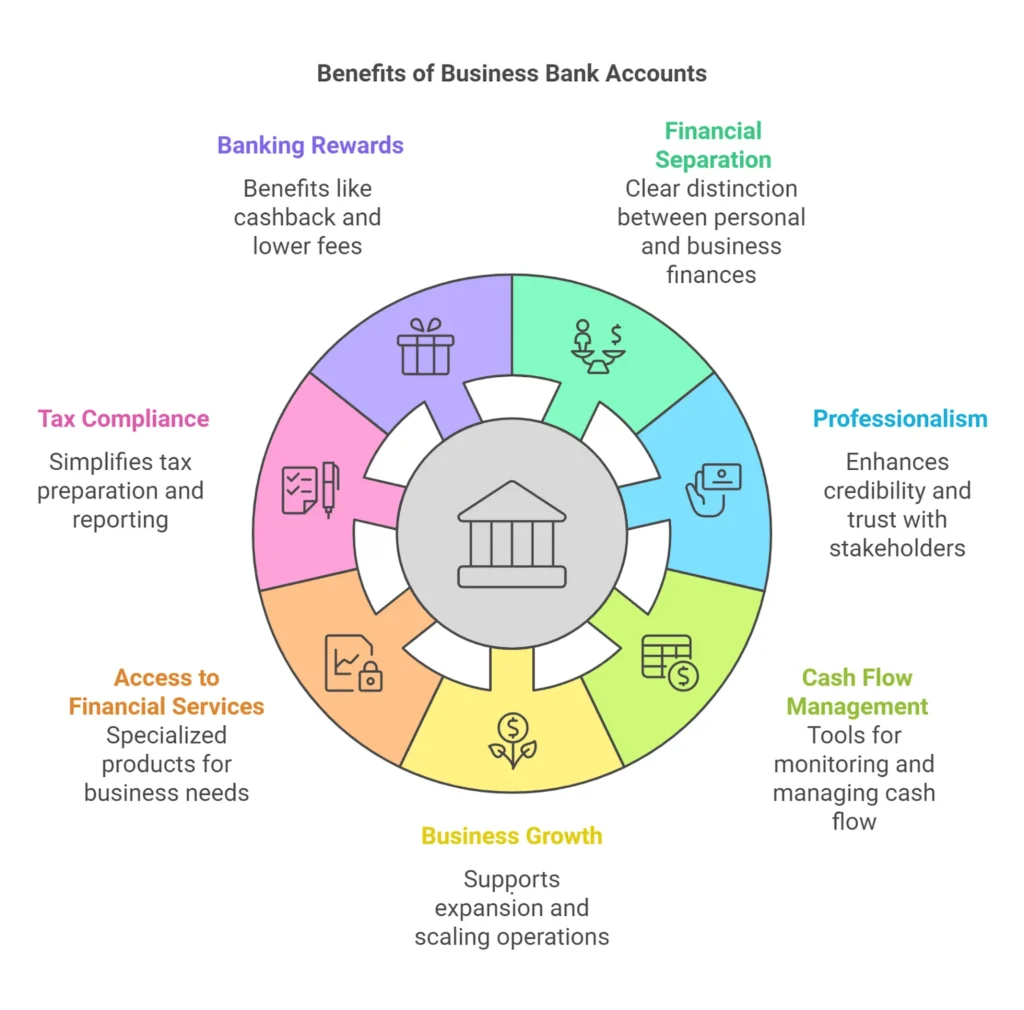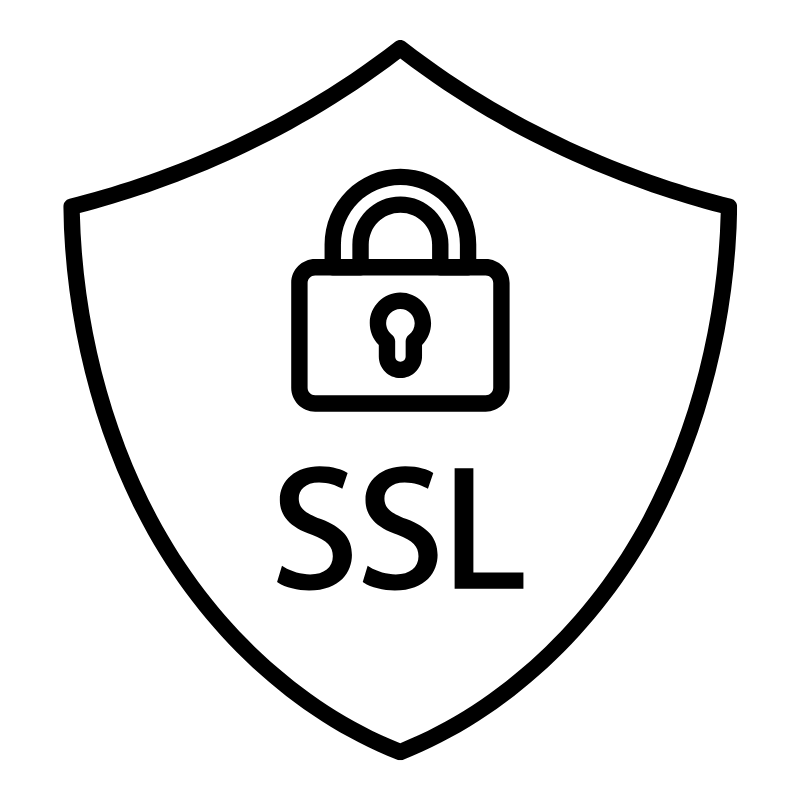Do your personal and business finances live in the same space?
If so, you might be unknowingly setting yourself up for headaches when tax season rolls around.
A business bank account does more than just separate the two—it gives you the financial clarity and tools to thrive in South Africa’s competitive market.
With features like cash flow management tools, access to credit, and tax-ready reports, these accounts simplify the complex and allow you to focus on what matters—running your business.
Table of Contents
Why You Need a Business Bank Account in South Africa

1) Separates Personal and Business Finances
Keeping personal and business finances in one account creates confusion and increases the risk of errors.
A business bank account solves this problem by offering a clear distinction between personal and business transactions.
With a separate account, it’s easier to track expenses, identify profit margins, and prepare for tax filings.
This is critical when dealing with SARS to ensure compliance and avoid penalties.
Benefits of Separation:
- Clearer financial picture
- Easier tax preparation
- Professional appearance
- Simplified auditing process
- Better budgeting for both personal and business needs
- Makes it easier to calculate business profits and losses
- Simplifies bookkeeping and financial record-keeping
2) Enhances Professionalism
A business bank account sets a professional tone for your operations.
It projects credibility when paying a supplier, receiving payments from clients, or issuing a receipt to a customer.
This professionalism builds trust with stakeholders.
Having a business account also simplifies interactions with partners and clients by providing official documentation, such as account statements and branded checks, under your business name.
Professional Features:
- Business name on checks and statements
- Dedicated business debit or credit cards
- Professional online banking interface
- Merchant services for accepting payments
- Facilitates smoother transactions with other businesses
3) Improves Cash Flow Management
Managing cash flow is a top priority for any business.
A business account offers tools like real-time monitoring, automated alerts, and financial reporting to help you maintain steady cash flow.
These features are invaluable for identifying seasonal trends, preparing for tax obligations, and setting aside funds for investments.
- Provides real-time visibility into business finances
- Enables better forecasting of income and expenses
- Helps in identifying seasonal trends in cash flow
- Facilitates easier reconciliation of accounts
Cash Flow Management Tools:
| Tool | Purpose |
| Online banking | Real-time transaction monitoring |
| Mobile apps | On-the-go account management |
| Automated alerts | Notification of low balances or large transactions |
| Reporting features | Generate financial statements and cash flow reports |
4) Facilitates Business Growth
A business bank account provides the foundation for scaling operations by offering an organized financial system capable of handling growth.
As businesses expand, the volume of transactions and the complexity of financial management increase.
A dedicated account ensures that these processes remain streamlined, enabling smooth transitions as the company takes on new opportunities and responsibilities.
It also facilitates easier access to business loans and credit lines, which are often critical for growth. Banks use the financial activity in a business account to assess eligibility and risk.
Consistent and well-managed account activity boosts your chances of securing funding, helping you acquire resources like equipment, staff, or inventory to support expansion.
Building a business credit history is another significant advantage. By using your account responsibly, you establish a financial track record that demonstrates reliability.
A strong credit history is invaluable when negotiating loan terms, allowing businesses to secure lower interest rates and higher credit limits, which are essential for tackling larger projects.
Having a business bank account allows you to set aside funds for future investments. Whether saving for expansion, reinvestment, or unforeseen circumstances, a dedicated account helps you allocate resources systematically.
Many accounts offer tools to create sub-accounts or savings plans, ensuring that your financial goals are met without compromising day-to-day operations.
For growing teams, a business account supports multiple user access, making financial management collaborative and efficient. With features that allow authorized team members to handle tasks like payments and monitoring, you can delegate responsibilities while maintaining security.
This setup fosters operational efficiency, ensuring your financial systems grow alongside your team.
Growth Opportunities:
- Reinvestment of profits
- Expansion of product lines or services
- Hiring additional staff
- Opening new locations
- Investing in marketing and advertising
5) Provides Access to Financial Services
Business accounts often come with specialized banking products, such as business loans, overdrafts, and savings accounts, designed to meet the unique needs of companies.
These offerings make it easier to manage finances and plan for growth effectively.
In addition to products, business accounts provide access to relationship managers with expertise in business operations and financial planning.
These professionals offer valuable advice and insights, helping businesses navigate challenges and identify opportunities to optimize their financial strategies.
They also enable the use of merchant services, allowing companies to accept payments through various methods, including credit cards, mobile money platforms, and electronic funds transfers.
This capability enhances customer convenience and ensures a seamless payment process, which is crucial for maintaining a professional image.
For businesses focused on long-term financial planning, these accounts often include business-specific savings and investment options.
Such features allow companies to grow their capital and prepare for future opportunities, ensuring financial stability.
Also, many business bank accounts provide access to international banking services, making them indispensable for companies involved in import and export.
These services facilitate cross-border transactions, currency exchanges, and global financial operations, enabling businesses to thrive in international markets.
Available Services:
- Business loans and overdrafts
- Foreign exchange services
- Payroll processing
- Business insurance products
- Investment and wealth management
6) Simplifies Tax Compliance
A business bank account significantly simplifies tax compliance by consolidating all transactions in one place.
This centralization makes it easier to track income and expenses, ensuring accurate and organized records that are readily available for reporting and audits.
It also streamlines the process of calculating VAT by providing clear visibility into taxable transactions.
With all your business activities recorded separately, you can quickly identify amounts owed to SARS, reducing errors and saving time during tax preparation.
Tracking deductible expenses becomes more efficient with a dedicated account. Every business-related payment is easily traceable, so you don’t miss out on claiming legitimate deductions, which can lower your overall tax liability.
Many business accounts offer reporting tools that help produce detailed statements required for accurate filings, minimizing the stress of meeting compliance deadlines.
Tax Compliance Benefits:
- Easier preparation of financial statements
- Simplified auditing process
- Reduced risk of tax errors
- Better tracking of tax-deductible expenses
- Easier separation of personal and business income
7) Access to business banking rewards
Many banks in South Africa offer rewards programs for business accounts. These include cashback on expenses, lower transaction fees, or discounted services.
By leveraging these rewards, you save money while enjoying added value.
 Web Hosting
Web Hosting Windows HostingBuilt for Windows apps and websites – stability, speed and flexibility
Windows HostingBuilt for Windows apps and websites – stability, speed and flexibility Reseller HostingLaunch a hosting business without technical skills or expensive infrastructure
Reseller HostingLaunch a hosting business without technical skills or expensive infrastructure Affiliate ProgramRefer customers and earn commissions from sales across our platform
Affiliate ProgramRefer customers and earn commissions from sales across our platform Domain SearchFind and secure a domain name in seconds with our quick lookup tool
Domain SearchFind and secure a domain name in seconds with our quick lookup tool CO ZA Domains
CO ZA Domains All DomainsExplore domain names from over 324 TLDs globally – all in one place
All DomainsExplore domain names from over 324 TLDs globally – all in one place Free Whois Lookup Tool South Africa
Free Whois Lookup Tool South Africa VPS
VPS SSLs
SSLs









